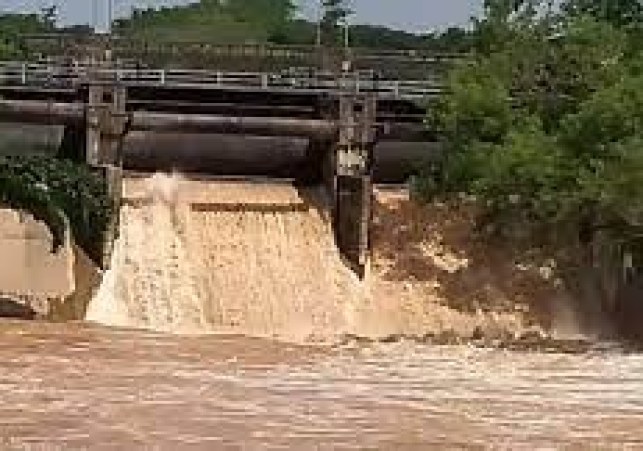
Chandigarh Records Heaviest Rainfall in 24 Hours
Chandigarh Drenched in Record-Breaking Deluge of 302.2 mm Rainfall in 24 Hours
- By Gurmehar --
- Monday, 10 Jul, 2023
Chandigarh experienced an extraordinary event as it encountered the highest-ever recorded rainfall of 302.2 mm within a 24-hour period, with the figures measured until 8:30 am on Sunday morning. The city faced severe consequences, including road collapses and the destruction of the Bhakra main water line responsible for supplying drinking water. The situation led to the closure of schools for two days and widespread flooding.
According to officials from the Chandigarh Meteorological Department, such rainfall has never been witnessed in the region before. In response to the crisis, the Chandigarh Administration reached out to the National Disaster Response Force (NDRF) for assistance. The rising water levels in Sukhna Lake also prompted the need to open the flood gates to prevent any further adverse situations.
The surrounding villages, such as Kishangarh, Zirakpur, and Baltana, located in low-lying areas, were expected to be particularly affected. Due to the heavy rainfall and its aftermath, the Chandigarh Administration announced the closure of schools for July 10th and 11th. The administration urged school managements to prioritize the safety and security of students, faculty, and staff when making decisions about reopening.
This rainfall event has been deemed the heaviest in recent memory, surpassing all previous records. The sudden downpour significantly reduced the maximum temperature on Sunday, reaching 26 degrees Celsius, eight degrees below the normal range, while the minimum temperature stood at 23.6 degrees Celsius.
Pipeline carrying drinking water to Chandigarh destroyed
In addition to the consequences of heavy rainfall, Chandigarh encountered another setback as one of the four pipelines responsible for delivering drinking water from the Bhakra main line to the city was damaged at the Kajauli waterworks. As a result, the entire city would experience a water supply disruption for a couple of days. The Municipal Corporation announced that on Monday morning, the water supply would be at low pressure, and in the evening, there would be no water supply at all.
The relentless rainfall since Sunday night caused extensive flooding on the city's roads. While the intensity of rain is expected to diminish from Monday onward, humidity is likely to persist as a cyclonic circulation has formed over the region, including parts of Pakistan, contributing to the ongoing precipitation, according to meteorological officials.
Both floodgates of Sukhna opened up to 9 inch for first time
In an unprecedented move, the Chandigarh Administration's Chief Engineer confirmed that both flood gates of Sukhna Lake were opened to a remarkable height of 9 inches. While one gate was initially opened at 6 am, the decision was made not to open the third gate. However, due to the overwhelming volume of water, it began surpassing the floodgate. The Chief Engineer, CB Ojha, stated that typically the floodgates are only opened to a maximum of 2 to 3 inches.
This marked the first instance where they were opened to such a significant extent. Ojha further mentioned that continuous coordination was maintained with the Deputy Commissioners of Mohali and Panchkula. As the water level at Sukhna Lake had surpassed 1,164 feet, one of the gates was closed at 4:45 pm, while the other remained open. Prior to this event, the water level had reached 1,161 feet the previous week, prompting the engineering officials to take swift action and open the floodgates as the danger mark of 1,163 feet was reached. Ojha emphasized that a dedicated team from the engineering department had been on high alert at Sukhna Lake for the past 24 hours.
Flooding in the entire city
Numerous houses in villages across the city were inundated with knee-deep water as a result of heavy rainfall. The city's roads faced severe congestion as commuters struggled to navigate through waterlogged streets. The impact was so significant that even government-owned residences were filled with knee-deep water, causing damage to residents' belongings. Additionally, the basements of hotels, fitness clubs, and banquets were flooded, further exacerbating the situation.
Dumping ground Leachate enters Dadumajra lanes
Dadumajra residents faced distress when a significant section of a 15 to 20 ft-high wall, constructed to protect them from a waste mountain, collapsed on Sunday morning. The wall had been erected last year. In addition to this, residents residing near the landfill reported that leachate, mixed with dirty water, seeped into their homes due to continuous rainfall. The pungent odor emanating from the landfill intensified after the rain.
The roads leading to the residents' houses were transformed into flowing streams of leachate. Furthermore, a portion of the road in Sector 14 also caved in, resulting in traffic diversions from Sector 14/15 light point towards PGI chowk. The Chandigarh Traffic police issued alerts across various platforms, urging citizens to avoid the affected stretch of road and seek alternate routes. The road wing department was promptly notified by the traffic police to implement immediate remedial measures and ensure public safety.
Emergency control rooms
The Municipal Corporation swiftly established round-the-clock Emergency Control Rooms at three strategic locations in the city, namely Sector 15, Manimajra, and Sector 17- ICCC. Officers promptly manned the control rooms and coordinated the activation of fire and rescue services. To address various issues arising from the heavy rainfall, the MC organized 18 Quick Response Teams (QRTs) specializing in handling waterlogging, fallen trees, drinking water supply disruptions, electrocution risks, and other emergencies. Municipal Commissioner Anindita Mitra, accompanied by officials, personally visited the affected areas to evaluate the situation.
In Dadumajra, suction tankers were deployed to mitigate the flow of leachate onto the roads. However, the inclement weather also impacted train services, leading to the cancellation of Chandigarh-bound Vande Bharat, Jan Shatabdi, and all Kalka-Shimla trains on Sunday, causing inconvenience to stranded passengers. As a result, the evening Shatabdi train arrived in Delhi at 1 am on Saturday.





